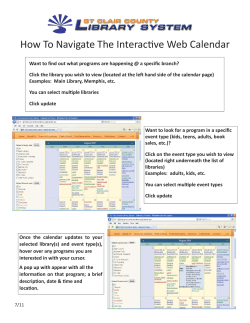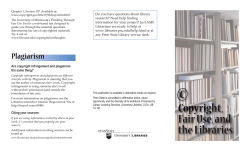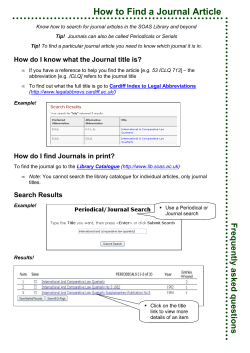
Why Your Library Should Move to Ex Libris Alma
Why Your Library Should Move to Ex Libris Alma An Ex Libris Alma Solution Brief Why Your Library Should Move to Ex Libris Alma To meet the evolving needs of users in the rapidly changing research and learning environments, and to achieve greater efficiency in a time of economic and financial pressure, libraries are increasingly looking for new paradigms to deliver improved and completely new services to users. Recognizing libraries’ present and future needs, and in collaboration with diverse global partners, Ex Libris has developed its next generation library management service. Ex Libris Alma is a true unified solution that supports the entire suite of library operations—selection, acquisition, metadata management, digitization, and fulfillment—for the full spectrum of library materials, regardless of format or location. As a next-generation platform, Alma offers significant benefits over today’s systems: Unified Management Environment Ex Libris Alma consolidates As an increasing portion of the library’s collection multiple dispersed solutions into shifts to electronic and digital resources, a unified one unified solution: management environment becomes essential. Aleph/Voyager Today, libraries are managing multiple systems to Verde/Meridian accommodate resources in different formats. This DigiTool leads to a duplication of effort and data. Alma SFX and SFX KnowledgeBase provides a single context in which to manage resources of all types. MARCit! This allows staff to work more effectively within one environment, and the consolidated data This single point of management allows for advanced analytics through an for all library resources is integrated view of the entire collection. delivered as a cloud-based service. By managing digital resources in the same system as the rest of the collection, Alma can improve the visibility of a library’s unique resources. Today, collections are fragmented across multiple digital asset management systems. Archival and heritage resources that make an institution unique are easily overlooked. Alma integrates digital collections to highlight resources that differentiate a collection. Key benefits ¾ Eliminates the need to work and synchronize data across systems ¾ Comprehensive analytics for the whole collection ¾ Highlights the differentiators of a library’s collection Optimizing Workflows and Process Current systems require manual processing to perform many workflows. With Alma, Alma allows libraries to benefit from workflows are managed from within the optimization to services such as system. Alma moves to a “push” paradigm for digitization requests by patrons, task management. Staff work will be automated purchasing requests, highlighted through task lists and dashboard course reading services and more. widgets, allowing them to quickly assess the work that they need to perform. System-managed workflows lead to a reduction of errors and gaps in communication. They allow Alma to automate many workflows that currently require manual work. Because Alma knows the steps that are necessary to complete a lifecycle such as ordering, it can perform these steps with no human intervention. This frees staff to work on those tasks that require decision making. Alma allows for advanced analytics to drive better decision making and as a means to track processes that require optimization. For example, Alma can track various steps that are necessary to complete end user requests, such as fulfillment, and highlight steps that are slowing down the fulfillment of requests. More specifically as an example - since the digitization request lifecycle is modeled into the system, Alma can tell you that your digitization backlog is caused at the stage of scanning and depositing resources, allowing you to more precisely allocate staff where it’s needed Key benefits ¾ Brings staff attention to work that needs to be performed ¾ Focus staff on making decisions while letting the system automate repetitive tasks ¾ More precise analytics to assist with planning and policies Optimization and Collaboration In Action Libraries are becoming more conscious of the Alma provides multiple collaborative fact that not all of the resources they acquire options, including the Community are being used. One response has been to Zone, a shared, open catalog built and shift from a “just-in-case” collection maintained by the Alma community. development model to a “just-in-time” model. Alma features support for user-driven Collaborative Business Intelligence collection development processes for both allows libraries to tune their processes physical and electronic resources. and policies based on shared and local analytics. Using this model, a library can refrain from buying a resource until it’s actually needed. For e-books, patrons will initiate the purchase by clicking through and reading the book online. For print books, they can request that the library purchase the resource, which will initiate a rush acquisitions request; the item will be delivered to the patron once it arrives. Libraries receive a lower return on investment for managing local catalog records that describe materials held by many institutions. Alma’s Community Zone leverages shared, community data, reducing the need to maintain duplicate data. For local needs and unique collections, Alma’s hybrid model of metadata management supports both community and local data. Libraries working with Alma can benefit from shared data while still retaining full control when it supports the needs of their users. To describe unique digital collections, Alma’s metadata management environment features support for multiple metadata schemas. Support for the MARC21, Dublin Core, and MODS standards allows Alma to manage the range of resources in a library’s collection. The metadata management infrastructure allows Ex Libris to add additional formats in the future, providing a sustainable platform for future changes in cataloging standards. Key benefits ¾ Demand-driven collection development increases collection usage ¾ Integrated data services enable streamlined ordering and cataloging ¾ Hybrid shared/local data environment ensures that local needs are supported ¾ Non-MARC metadata schemas support description of an array of resources Smart fulfillment Alma’s Smart Fulfillment framework simplifies user interaction with the library Alma provides seamless integration system, whether on-campus or off. By with the Ex Libris Primo discovery consolidating all fulfillment options to one solution, including new services such place, it provides a single source for as user-driven collection patrons to find available resources and development. place requests for loans, digitization, and Alma checks for all fulfillment purchases. This allows the library to options—print, electronic, and highlight resources that are one click away digital—and presents users with the and cost nothing to deliver, while providing best alternatives based on the user’s access to costlier resource sharing requests rights. only when no local option is available. In combination with demand-driven collection development, this increases the value and usage of the collection. Key benefits ¾ Optimizing resources utilization by highlighting available resources ¾ User-friendly patron interactions ¾ Precision in tracking quality of service to patrons Open Platform Alma is more than a library management service—it’s a platform for developing new services. Alma implements open communication standards such as OpenURL, SRU, z39.50, EDI, NCIP, and SIP2. Where an open standard is not available, Alma’s webservices and APIs can be used for interacting with external systems. This allows libraries to extend the system and develop improved and innovative services. Alma is also built to integrate with existing institutional systems. Student and financial data can be synchronized automatically. By relying on external systems as a source of data, Alma allows libraries to realize their institutions’ investment in existing systems, such as student information, registration, financial, and learning management systems. Key benefits ¾ Adherence to open standards and open APIs allows libraries to extend the system ¾ Streamlining integrations via industry standard open interfaces ¾ Advanced customizations options using open interfaces Cloud-based Software-as-a-Services Deployed as a cloud-based solution, Alma allows libraries to eliminate hardware and maintenance investments. The entire Alma interface is served via a web browser. In addition to removing the need to manage and maintain local servers, Alma frees system administration staff from the need to install and maintain clients on local PCs. This frees up technical staff for other high-priority projects. All of Ex Libris Cloud Data centers are SAS-70 certified, and meet the highest standards related to security and high availability. In addition to a dedicated security office, Ex Libris has a dedicated cloud team that monitors the cloud operation 24 x 7 x 365 Moving to the cloud also lowers the barrier for entry to basic management processes. In today’s systems, many mission-critical workflows require server access. The staffing requirements for basic management processes such as record loading or integrating data from other campus systems must be managed by a system administrator. Since Alma provides user-friendly interfaces for all tasks, the system expertise needed to manage the system is significantly reduced. The subscription model for the Alma service allows for much more predictable budget planning. By reducing the initial investment in the system, libraries can more quickly realize the value of Alma and eliminate uncertainties associated with hardware upgrades and software updates. Key benefits ¾ No management of local hardware, clients, or upgrades ¾ Reduces the technical expertise required for basic management activities ¾ Subscription model provides for more predictable budgeting
© Copyright 2025














